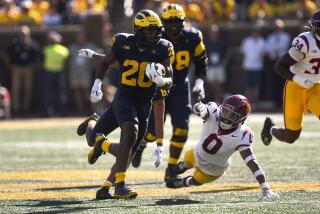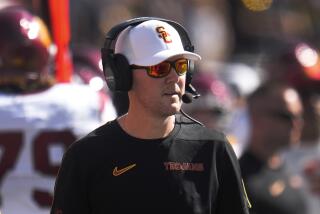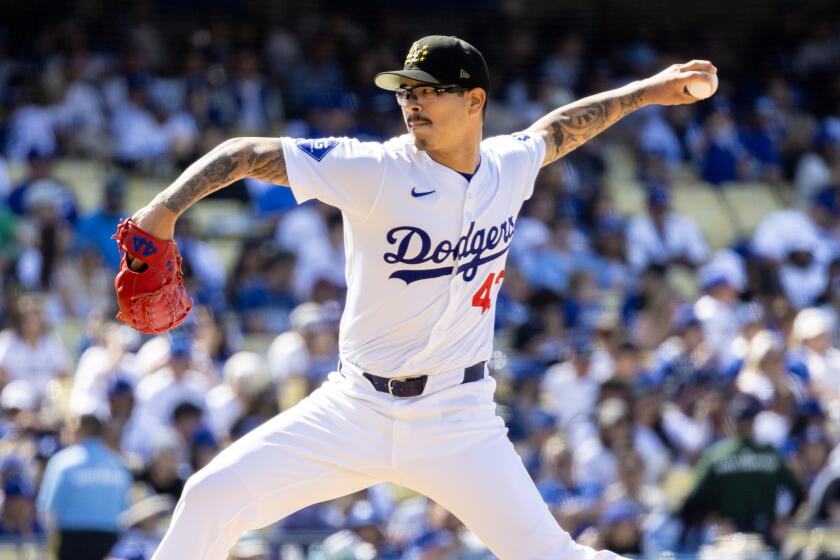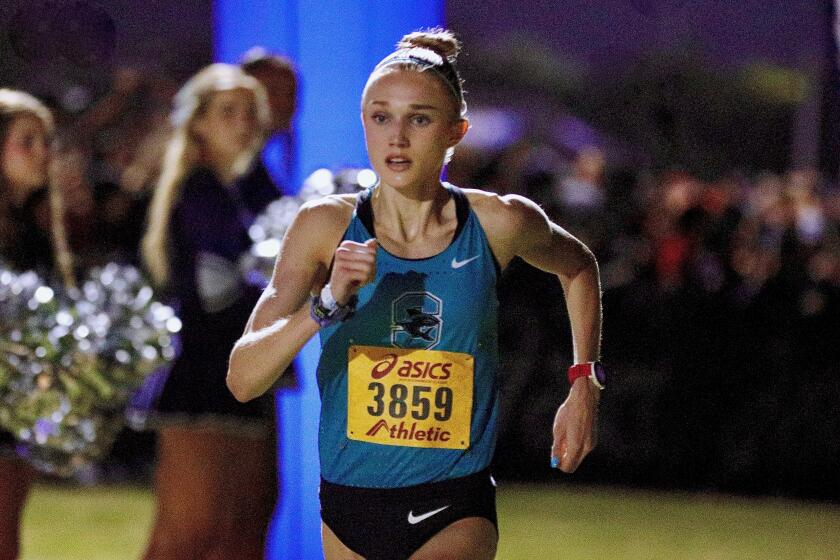Sudden Death Stuns NFL
The last minutes of Thomas Herrion’s life gave no indication of the tragedy to come.
The 23-year-old guard for the San Francisco 49ers looked fine coming off the field after an exhibition game Saturday against the Denver Broncos at Invesco Field. He knelt alongside his teammates to pray in the locker room. Suddenly, he collapsed.
“We began to say the Lord’s Prayer,” 49er Coach Mike Nolan recalled Sunday in a news conference at team headquarters. “Right about the time of completion, someone in the back had said that Thomas was down. At that time, everyone kind of stood up and cleared out. ... And the medical staff was quickly at work on Thomas.”
Herrion was taken to a hospital, where he was pronounced dead at 11:18 p.m. Mountain time, about one hour after the game ended.
The death came about four years after Minnesota Viking lineman Korey Stringer died of heat-related illness at training camp in Mankato, Minn., on a day when heat and humidity created a heat index of 109. Temperatures in Denver on Saturday were in the mid-60s with 50% humidity, although experts say heat illness can still occur in relatively cool conditions.
An autopsy on Herrion was performed Sunday in Denver, but the coroner said the cause of death cannot be determined until toxicology tests are completed, a process that takes three to six weeks.
It was a relatively low-key scene Sunday at 49er headquarters, with a dozen or so reporters milling about and four local television vans parked in front. Someone had left a small, potted bouquet of white flowers on the doorstep with a card reading “In memory of Thomas Herrion,” and the team dispatched a security guard to patrol the parking lot and make sure the few players who trickled out of the building didn’t stop to speak with the media. In the afternoon, the flag outside was lowered to half-staff.
Before the guard arrived, at least one player did talk. Safety Dwaine Carpenter spoke in a trembling voice about kneeling near Herrion during the postgame prayer.
“It looked like a seizure,” Carpenter said. “But he didn’t move at all anymore. He was just laying there.”
Carpenter said there didn’t appear to be anything wrong with Herrion when he left the field after the game, and that the man was “laughing and smiling” as he walked to the locker room. Herrion was low on the depth chart and was among the last players inserted in the game.
But Herrion was on the field for every play of a 14-play, 91-yard drive that ended with a touchdown with two seconds to play. When he came off the field, he went to the bench and caught his breath with the help of an oxygen tank -- not unusual for a lineman, particularly one playing in mile-high Denver -- then checked with former 49er lineman Guy McIntyre, now the club’s director of player development, for an informal assessment of his play.
“He just asked me, ‘How was that, Coach?’ and I said, ‘It was good,’ ” McIntyre said. “I just saw him get some oxygen, because it was a 14-play drive and he was very winded. I’m sure I would be winded after that. And that was pretty much the gist of the conversation. From that point on, he was fine.”
It is extremely rare for an NFL player to die during or immediately after a game. Chuck Hughes, a wide receiver for the Detroit Lions, died of a heart attack Oct. 24, 1972, during a game in Detroit against the Chicago Bears. In 1979, St. Louis Cardinal tight end J.V. Cain died of a heart attack during training camp.
In April, Arena Football League player Al Lucas of the Avengers died of a spinal-cord injury he suffered when making a tackle.
“Right now it’s a day of mourning for the 49ers family,” Nolan said. “We lost a teammate and a very good friend as well.”
Herrion, who earned $775 a week in training camp, had previously failed to make the 53-man roster of the 49ers and Dallas Cowboys. Signed as an undrafted rookie free agent by the Cowboys in May 2004, he spent last summer at training camp in Oxnard but was released before the opener. Dallas re-signed him to the practice squad and kept him on it for two weeks.
After practice Sunday, the Cowboys gathered to collectively pray for their fallen former teammate. Coach Bill Parcells told reporters he always liked Herrion.
“He just kind of came in as one of those underdog kind of kids,” Parcells said. “He just hung in there.”
Last December, the 49ers signed Herrion to their practice squad, where he remained for the final three weeks of the season. This spring, San Francisco allocated him to NFL Europe’s Hamburg Sea Devils, where he started in 10 games and played well enough to earn an invitation to 49er training camp.
His older brother, Love Savior, said Herrion returned from Europe looking in better shape than he had in years, so much so that he took a ribbing from his family in Fort Worth.
“He had trimmed up, got more solid,” said Savior, 32, reached Sunday at home. “He didn’t have a gut no more. Real good shape.”
Savior said his brother’s weight had gone up and down in recent years, roughly in the range of 310 to 340 pounds, but emphasized Herrion didn’t smoke, drink or use dietary supplements.
“He never took any kind of supplements,” Savior said. “No protein shakes, no get-thin-quick stuff. Trust me, his money went to CDs and video games, not supplements. He’s a country boy. He’d just go to Granny’s house and she’d cook him a good meal.”
Since the 2001 death of Minnesota’s Stringer, the NFL has been more vigilant about discouraging players from using various kinds of dietary supplements, particularly ones that affect the body’s ability to regulate heat. Although it was never proven that Stringer had supplements in his system -- he died of heat-related causes -- open bottles of now-banned supplements were found in his locker at training camp.
Herrion’s agent, Fred Lyle, said the player had undergone several in-depth physical examinations over the last 1 1/2 years with the 49ers, Cowboys and Sea Devils, and there was no indication anything was awry. He said he spoke over the phone to Herrion virtually every day, often before and after practice. The two spoke by phone just before Herrion took the field Saturday.
“He was really excited,” Lyle said. “He felt like he had had a really good week of practice.”
Herrion’s death came 20 months after that of his father, J.C. Herrion, a general contractor and pastor, who died at 51 after suffering his second stroke.
A jovial man with a round face and a larger-than-life laugh, the younger Herrion answered to several nicknames over the course of his football career, among them “Big T,” “Meal Ticket” and “the Train.” Evidently, the latter appealed to him during his days at Kilgore College, a community college in Kilgore, Texas, because he celebrated a big block by pumping his fist and making the sound of a train whistle. As a Hamburg player, he went by “Thunder.”
“At first, it started because of my helmet,” he said in an April 2005 story that ran on the NFL Europe website. “I couldn’t fit into the first one and I had to get a bigger helmet brought in, so coach called me ‘Thunder’ because of my big head, but then it stuck with me I think because I make so much noise. I have fun on the field and I bring all the attention I can to me. It’s like thunder; you can’t see it, but you can hear it, only in my case you can see me and hear me. I like the name.”
In the same story, Herrion said his ability to manage his weight was an issue when he played for the Cowboys.
“When I went to Dallas I weighed 340 pounds, and I had to get down to 315, so that was rough,” Herrion said. “Coach Parcells was very persistent on his weights. You could be under as much as you wanted, but you couldn’t be over. He would charge you $300 if you weren’t at your weight, and here I was as a free agent with no signing bonus, so I had to lose that weight.”
He said he lost the weight and passed all his tests, including running six 50-yard dashes in a minute.
Nolan and McIntyre said excessive weight was not an issue for Herrion as a 49er.
“There are a lot of bigger guys than him,” McIntyre said.
In his senior season at Utah, Herrion started every game at left guard after making the transition from tackle. He was named a team captain and was selected to the 2003 Utah Football Leadership Committee.
“He was an outstanding, quality young man ... loved, respected and admired by all of us,” former Utah and current Florida Coach Urban Meyer said in a written statement.
Raised in an impoverished section of east Fort Worth, Herrion frequently returned to the area and delivered inspirational speeches to students at his high school and middle school.
“He was the first to admit he wasn’t a perfect angel, but he succeeded because he had people who cared about him,” said Robert Phelps, football coach at Polytechnic High, Herrion’s alma mater. “We talked several times about what would happen if the NFL didn’t work out. He said he wanted to come back here to teach and coach.”
Savior said his brother always vowed to build a house for his mother, Janice, on land the family owns in Louisiana. It was a promise he couldn’t fulfill; his mother still lives in a Fort Worth apartment.
“He’d always say, ‘Mama, I’m not slacking this summer. I’m going to work harder,’ ” Savior said.
Herrion is survived by his mother, two brothers and three sisters.
“We can’t swallow it,” Savior said. “When we all get together, we can’t wait until Thomas gets home. The funeral is going to be real hard for us.”
Last week, a 13-year-old fan, Austin Bacchi of San Bruno, attended a 49er practice with a booster group. Afterward, a hulking lineman tossed him a glove as he walked off the field.
Later, at an autograph session, the lineman politely signed his name -- Thomas Herrion -- on the sweaty glove. “I was happy, and he was really nice,” Bacchi said in a telephone interview Sunday. “I said thanks and said, ‘I hope you do really well this season.’ ”
The boy held the sweaty, torn glove during the drive home. When he tried it on, he was amazed at how huge Herrion’s hands were. Sunday morning, Bacchi’s parents learned the bad news from a relative. His father went into Austin’s room to check the glove to be sure.
“This,” he said, “is the guy.”
*
Times staff writer Tim Reiterman contributed to this report.
More to Read
Go beyond the scoreboard
Get the latest on L.A.'s teams in the daily Sports Report newsletter.
You may occasionally receive promotional content from the Los Angeles Times.











